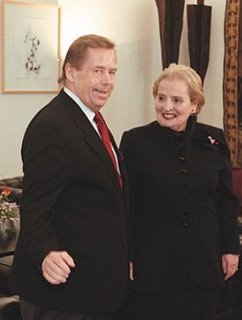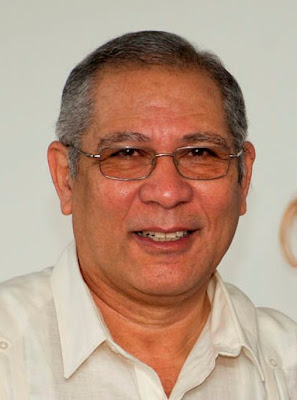CUBA: HUMAN RIGHTS A LA HABANA
Cuba: Human rights à la Havana
Published: July 20, 2006
Cuba
 At its spring commencement in May, Columbia University placed one empty chair on the stage among the assembled university officials and honored guests. The chair was for the Cuban democracy activist Oswaldo Payá Sardiñas.
At its spring commencement in May, Columbia University placed one empty chair on the stage among the assembled university officials and honored guests. The chair was for the Cuban democracy activist Oswaldo Payá Sardiñas.<--- Madeleine Albright, ex Secretaria de Estado de los E.U. nacida en la antigua Checoslovaquia quen emigr'o siendo una nina a ese pa'is huyendo del Comunismo, al lado de Vaclav Havel, ex Presidente de la Rep'ublica Checa.
Payá was to receive an honorary degree for his remarkable work to help transform Cuba from a totalitarian dictatorship to a constitutional democracy, but the Cuban government denied permission for him to leave the country to receive this honor. This was not the first time Payá had been denied the right to travel. Indeed, the same fate befalls thousands of Cubans every year.
This particular incident is noteworthy because it happened just one week after Cuba was elected to the newly created United Nations Human Rights Council - a body charged with promoting and protecting human rights. One basic human right is the freedom to leave and return to one's own country at will.
The day following Cuba's election to the United Nations' human rights body, Payá presented Programa Todos Cubanos, Program for All Cubans, to international media at his home in Havana. This truly democratic plan resulted from discussions held over two years with some 12,000 Cubans living in Cuba and abroad. It provides an excellent road map for a nonviolent transition to democracy.
The program guarantees Cubans the rights to worship and express themselves, including the right to criticize their government. It would guarantee the right to travel freely, own private property and engage in commerce. The 170-page document also outlines a fair electoral process and allows for the peaceful reintegration of Cubans living abroad into Cuban life and society.
The Program for All Cubans, and the national dialogue from which it sprang, is an extension of the Varela Project, a remarkable model of an indigenous, grassroots effort to bring about democratic reform. More than 10,000 Cubans - overcoming a culture of fear and intimidation - signed their names to a petition calling for a referendum on free elections, freedom of expression, free association, free enterprise and the release of all peaceful political prisoners.
To date, more than 25,000 people have signed the petition despite a government crackdown on people who organized and participated in the effort. Nearly 50 people remain in Cuban jails for collecting signatures. This crackdown came despite a provision in the current Cuban constitution providing that citizens may introduce legislation in the National Assembly by collecting 10,000 signatures.
 In support of "Cuba's peaceful political opposition," the European Union's Council of Foreign Ministers adopted a resolution in June that "deplores the further deterioration of the human rights situation in Cuba," and calls for the release of all political prisoners. The ministers noted that they were particularly concerned about the Cuban government's participation in "several dozen acts of violent harassment and intimidation, including acts of repudiation" against citizens, political rivals and journalists. The foreign ministers had even called on the Castro regime to allow Payá to travel to their June meeting in Brussels.
In support of "Cuba's peaceful political opposition," the European Union's Council of Foreign Ministers adopted a resolution in June that "deplores the further deterioration of the human rights situation in Cuba," and calls for the release of all political prisoners. The ministers noted that they were particularly concerned about the Cuban government's participation in "several dozen acts of violent harassment and intimidation, including acts of repudiation" against citizens, political rivals and journalists. The foreign ministers had even called on the Castro regime to allow Payá to travel to their June meeting in Brussels.Oswaldo Payá Sardiñas --->
We have worked to lift the oppressive weight of totalitarian, Communist systems, and we understand the importance of solidarity for Cuba's democrats offered by people from free countries. To support emerging democracies, the international community must support the courageous individuals in those countries who take tremendous risks to advance democratic reforms. Payá and his Christian Liberation Movement deserve and desperately need the support of the international community and the UN Human Rights Council.
For democracy to take root in any undemocratic country, it must be built from within. The Program for All Cubans, though little noticed internationally, is a monumental document that provides a model for emerging democracies everywhere on how to encourage nonviolent democratic change.
As the new Human Rights Council begins its work to protect the rights of citizens around the world, we urge everyone who supports human rights to call on council members and all UN member states to bring their influence to bear on the Castro regime. Cuba's government should abide by its own constitution and put the Program for All Cubans to a national vote.
The people of Cuba have shown the way to a new future on the island - where every individual counts and the dignity of every human being is respected. Their voice should be heard.
Vaclav Havel is the former president of the Czech Republic and a founder of the International Committee for Democracy in Cuba. Madeleine Albright is former U.S. secretary of state.
Cuba
At its spring commencement in May, Columbia University placed one empty chair on the stage among the assembled university officials and honored guests. The chair was for the Cuban democracy activist Oswaldo Payá Sardiñas.
Payá was to receive an honorary degree for his remarkable work to help transform Cuba from a totalitarian dictatorship to a constitutional democracy, but the Cuban government denied permission for him to leave the country to receive this honor. This was not the first time Payá had been denied the right to travel. Indeed, the same fate befalls thousands of Cubans every year.
This particular incident is noteworthy because it happened just one week after Cuba was elected to the newly created United Nations Human Rights Council - a body charged with promoting and protecting human rights. One basic human right is the freedom to leave and return to one's own country at will.
The day following Cuba's election to the United Nations' human rights body, Payá presented Programa Todos Cubanos, Program for All Cubans, to international media at his home in Havana. This truly democratic plan resulted from discussions held over two years with some 12,000 Cubans living in Cuba and abroad. It provides an excellent road map for a nonviolent transition to democracy.
The program guarantees Cubans the rights to worship and express themselves, including the right to criticize their government. It would guarantee the right to travel freely, own private property and engage in commerce. The 170-page document also outlines a fair electoral process and allows for the peaceful reintegration of Cubans living abroad into Cuban life and society.
The Program for All Cubans, and the national dialogue from which it sprang, is an extension of the Varela Project, a remarkable model of an indigenous, grassroots effort to bring about democratic reform. More than 10,000 Cubans - overcoming a culture of fear and intimidation - signed their names to a petition calling for a referendum on free elections, freedom of expression, free association, free enterprise and the release of all peaceful political prisoners.
To date, more than 25,000 people have signed the petition despite a government crackdown on people who organized and participated in the effort. Nearly 50 people remain in Cuban jails for collecting signatures. This crackdown came despite a provision in the current Cuban constitution providing that citizens may introduce legislation in the National Assembly by collecting 10,000 signatures.
In support of "Cuba's peaceful political opposition," the European Union's Council of Foreign Ministers adopted a resolution in June that "deplores the further deterioration of the human rights situation in Cuba," and calls for the release of all political prisoners. The ministers noted that they were particularly concerned about the Cuban government's participation in "several dozen acts of violent harassment and intimidation, including acts of repudiation" against citizens, political rivals and journalists. The foreign ministers had even called on the Castro regime to allow Payá to travel to their June meeting in Brussels.
We have worked to lift the oppressive weight of totalitarian, Communist systems, and we understand the importance of solidarity for Cuba's democrats offered by people from free countries. To support emerging democracies, the international community must support the courageous individuals in those countries who take tremendous risks to advance democratic reforms. Payá and his Christian Liberation Movement deserve and desperately need the support of the international community and the UN Human Rights Council.
For democracy to take root in any undemocratic country, it must be built from within. The Program for All Cubans, though little noticed internationally, is a monumental document that provides a model for emerging democracies everywhere on how to encourage nonviolent democratic change.
As the new Human Rights Council begins its work to protect the rights of citizens around the world, we urge everyone who supports human rights to call on council members and all UN member states to bring their influence to bear on the Castro regime. Cuba's government should abide by its own constitution and put the Program for All Cubans to a national vote.
The people of Cuba have shown the way to a new future on the island - where every individual counts and the dignity of every human being is respected. Their voice should be heard.
Vaclav Havel is the former president of the Czech Republic and a founder of the International Committee for Democracy in Cuba. Madeleine Albright is former U.S. secretary of state.














0 Comments:
Publicar un comentario
<< Home